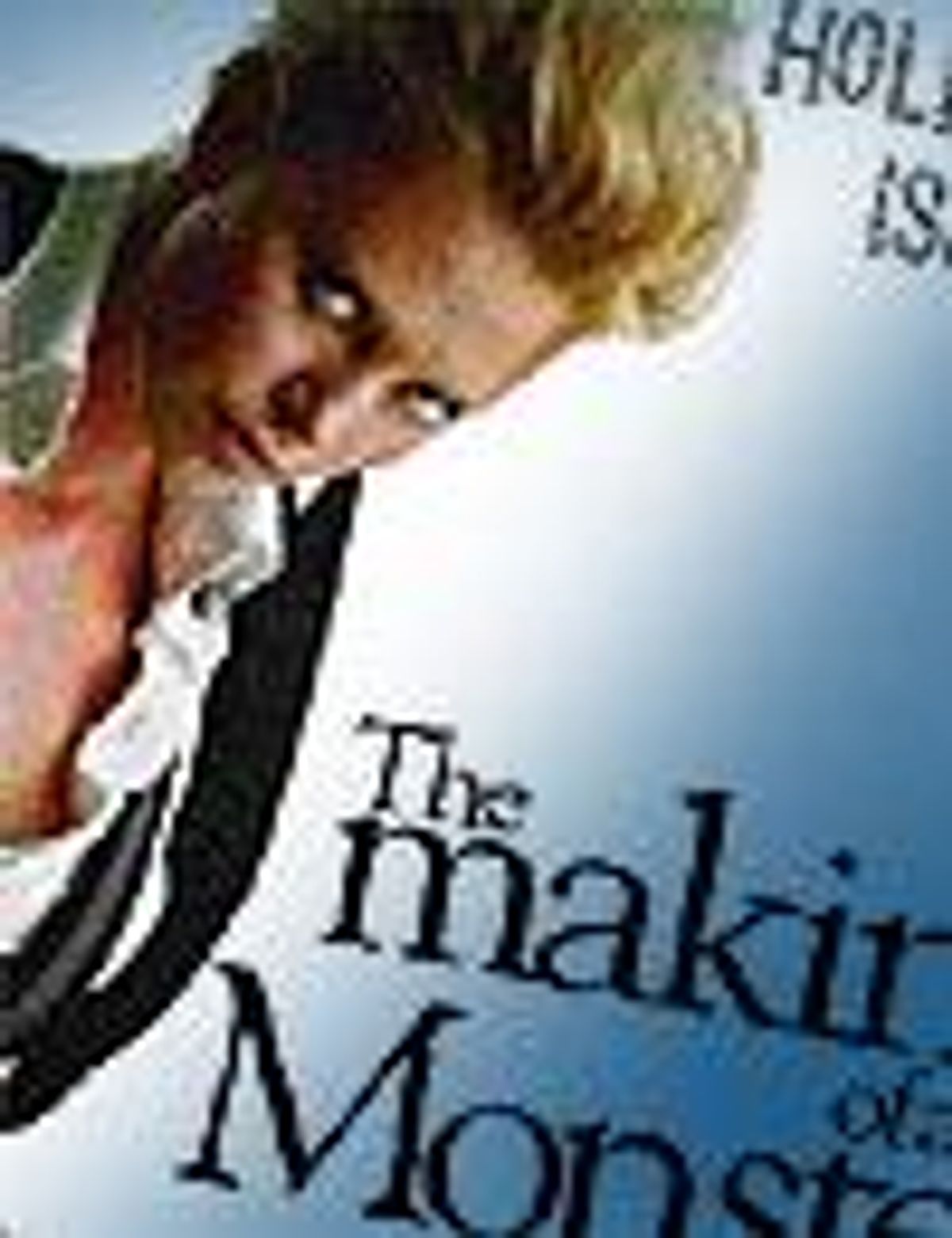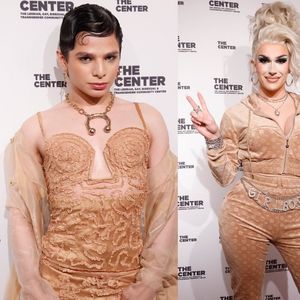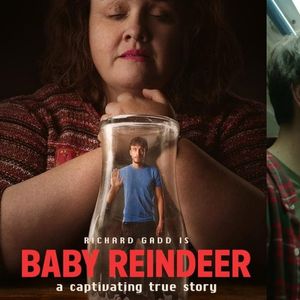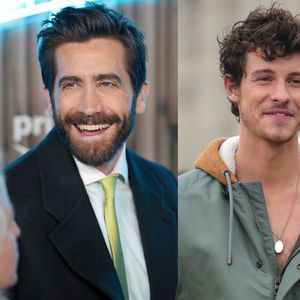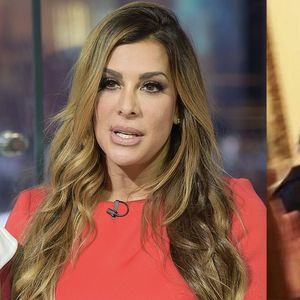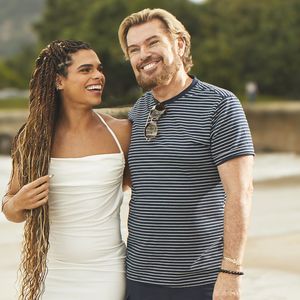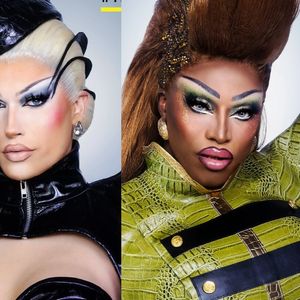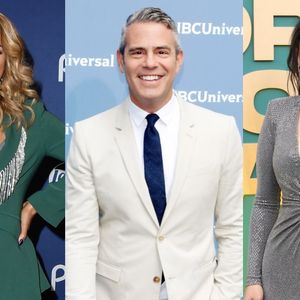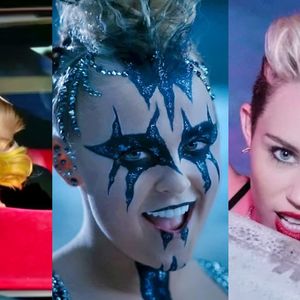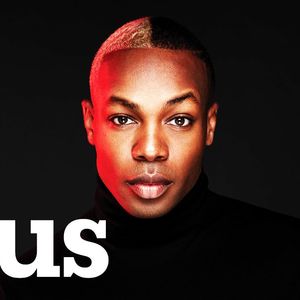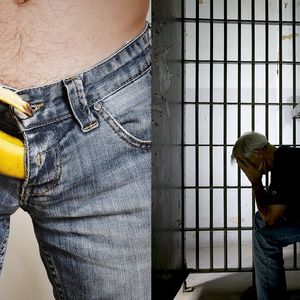Charlize Theron
is not what she appears. A tall, slim blond whose
Olympian beauty has served her well in an evolution from
small-town South African girl to Joffrey Ballet dancer
to fashion model to Oscar nominee, Theron is more big
sister than scheming ice princess. Her bubbling,
nearly goofy acceptance speech when she won the Golden Globe
in January for playing prostitute and seven-time
murderer Aileen Wuornos in the brutal, brilliant film
Monster was the real deal: In her mind,
she's just one of the guys, anxious for people to see
through the glossy surface and find the thoughtful,
congenial young woman underneath.
That's how she seems sitting at a garden
table at the Chateau Marmont hotel in West Hollywood,
Calif.: drinking coffee, smoking Winstons, and sharing
stories of the month she spent filming Monster
in Florida, re-creating both Wuornos's intense love
affair with a lesbian named Selby (Christina Ricci) and her
gruesome murders of seven johns. "Every day was
a challenge," Theron says. "Usually, you
pick three moments in a script, and you wait for those
three days to come and really stretch your acting
muscles. But in this case, every scene was that scene."
As an Alexander McQueen fashion show unfolds
inside the lobby--an ironic and unexpected
counterpoint that has conveniently emptied out the
hotel's garden--Theron seems to use the
interview to continue the long, therapeutic process of
analyzing exactly what happened to her during the
making of Monster. Having had it comparatively easy
in lead roles in more than a dozen slick, appealingly
packaged movies, including The Devil's
Advocate, The Cider House Rules, and The
Italian Job, Theron poured every ounce of her
emotional strength into this indie project, written
and directed by first-timer Patty Jenkins. As she
tells it, the work brought her to the verge of a breakdown.
Both Theron and Jenkins were determined to
humanize Aileen, a complicated, tortured, volatile
roadside sex worker who was executed by the state of
Florida in October 2002. Both knew that Theron's
physical transformation--the convincing makeup to
weather her skin, the dentures and contact lenses, the
30-pound weight gain--would be powerless without
Theron's ability to feel what Wuornos felt. And
that meant getting both the homicidal rage and the
heartbreaking lesbian love just right.
While both actor and director were intrigued by
"how somebody good crosses the line and becomes
somebody bad," Theron says that Monster
is not so much about a descent into evil as it is
"about love, the need and the willingness and the
eagerness and the hunger and the survival of wanting
to be loved by somebody, anybody."
Putting down her coffee cup, Theron recalls one
little-known fact about Wuornos: She was born in a
leap year, on February 29. The day the Academy Awards
will be given out this year would have been her 48th birthday.
The actual events of the movie take place in
1989--you would have been 14, still growing up in
South Africa. When do you first remember hearing
about Aileen Wuornos?
When I read the script.
Really?
Yeah. My manager sent it to me and said, "I
really love this script--it's an
independent, just read it for about 20
pages--you have to look at it." When I was
reading it, I didn't even know it was based on
a real person. It was only after I loved the script
and I called [my manager] J.J. and said "I really
like this" that she said, "Well, maybe you
should check out this Nick Broomfield documentary
[Aileen Wuornos: The Selling of a Serial
Killer]." He was kind enough to send me a rough
cut of [the second Wuornos documentary, Aileen: The
Life and Death of a Serial Killer,] that he
was working on at the time. I saw the other one; I saw
the A&E biography on videotapes and all of
that--that was really when the whole story came
to me.
Was the script illuminating in a way the
documentaries weren't?
Completely. It was only when we started reading some of
[Aileen's] letters from death row that I started
realizing how much research Patty [Jenkins] had really
done as a writer, because actual moments in her life
that she never talked about, that she only wrote about
and talked to [Aileen's longtime friend] Dawn Botkins
about, were actually in the script.
The Advocatehas been covering the Wuornos story since the
beginning, but I did feel the film makes you
understand her as a person in a way that news reports
just can't capture.
Yeah. Thank you. I feel like that was why Patty wanted
to make the story.
Aileen was reduced to so many labels that it was
difficult for anyone to see what kind of person could be
behind all of those. The movie is able to reveal
that person.
I really do think that Aileen didn't start off as
a bad person. I don't think anybody starts off
as a bad person. I think Aileen started off as a
healthy, normal child who was just born into very
specific circumstances, dealt with everything in her life,
survived it, moved on, put it in the past, and was
constantly hopeful to try and fix her life and make it
better. But Patty and I talked a lot about what it
takes for somebody just like me and you to cross that line
and actually become a bad person--to become a
killer. This was Aileen's story, but that story
in general really fascinates me. That's why I
love movies like Badlands and In Cold Blood. I
think in films we explore that world, but in our
society we don't.
Your manager was clearly supportive of your wanting
to do this role, but how did your friends or other
people in your life react when you said,
"I'm going to go play a serial
killer in a little independent movie by a first-time filmmaker"?
My mom read the script and she really loved it. She
actually said, "You'd be crazy if you
don't do this." My friends, I
think...it was a slow process for them. I didn't
really talk to a lot of people about it. The only thing that
happened was, I started watching the documentaries in
my trailer [with costars] Jason Statham and Seth Green
when I was doing The Italian Job. We had, like,
four hours off, and I said, "I got an offer to play
this woman and the script is really good, but I
don't know anything about her, so I was just
gonna watch these documentaries, if you guys wanna
come watch with me."
When [Aileen] came on [screen], I think Jason or
Seth said something like, "You're
kidding me, right? This is a joke, right?" I
went, "No, it's not." I mean, that was
their initial response when they saw her. [After that] we
just talked about it every day. They would ask me
what's going on and if I'm going to do
it and "How are you guys going to do the
transformation?" and "Who's going to
play Selby?" They were really interested in it,
and I think they were really the only two. And then,
of course, my boyfriend, who doesn't have a choice
in the matter [laughs], has to hear about it day in
and day out.
Did he read the script?
He did read the script. Yeah. He was extremely
shaken up by it. [He said,] "Well, babe, I love
you, and I don't know if I want to go and see
you go through all of these
experiences"--in a very protective way. He was
really inspired by the story and by the fact that
Patty sat down and in six weeks wrote the script. That
she went in and made it the way she wanted to make it. I
think all of that is very inspiring, whether you're
an actor or writer or anything.
Who's your boyfriend?
[British actor] Stuart Townsend.
Oh, right. He's cute. We like him.
[Laughs] He's very cute.
Together you can be the newest gay and lesbian icon phenomenon.
Really?
Sure! Speaking of actors, one of the first things
that Aileen says in the movie's narration is
"I wanted to be a movie star." You
had some traumatic events in your early life
[including her mother's shooting Theron's
abusive father to death when she was a teenager]:
Was there any sense of "There but for the
grace of God go I"?
Oh, all the time. I'm a true believer in faith,
but at the same time, we are the ones that make the
decisions in our life. And I think a lot of the time
our decisions are based on our survival; I think
Aileen's decisions were based on her survival. And we
would shoot the movie and we would do a scene where
she kills one of the innocent johns, and I would say
to Patty, "If only she
didn't..." And we would constantly do
that: "If only she didn't--if only
she'd just left." Because the truth of
the matter is, it wasn't that she was pure evil, it
wasn't like she was walking around with this thing
inside her. She was just trying to survive, and in
doing that, she made really, really bad decisions in
her life. And if she had maybe made one decision
different, who knows how it would have worked out for her?
Who knows how it would have worked out for me? I
can't imagine having to go back in my life and
redoing it all over again. The small little decisions that
you make that change your life forever, you know?
Tell me about living more or less as Aileen during
the filming. You've talked eating potato chips
and Krispy Kremes to put on the weight and how the
makeup and teeth were developed and how
it's your own hair, which is just incredible. But
more than the cosmetic transformation, tell me
about the physicality of the role: Aileen's
way of walking and that amazing head toss that just
captures her whole personality.
She's so the opposite of me. I have really bad
posture, and my head is always down. When I make a
point I tend to squint my eyes. Aileen is like
[momentarily takes on Aileen's posture],
head back, shoulders back, eyes big. What happened
was, the more I dived into her life, the more I
realized that everything she did physically came from an
emotional place. I started realizing that all of this
stuff--walking into the courtroom and doing that
stuff--that's a woman who's been
living a homeless life for most of her life. This is a
woman who sleeps under an underpass. This is a woman who
gets into a stranger's car and drives out of
state with them. I can't imagine living that
life. That's a woman who says, "I need to
take care of myself. Don't fuck with me." You
know? This is a woman who was 5 foot 3--which I
couldn't believe--who looks like
she's 6 foot 4.
How tall are you?
I'm 5-10, 5-9. The tension in her jaw and in her
mouth was really interesting. She had very crooked
teeth. I think we all carry tension somewhere in our
face--for me, it's my forehead. A lot of
cinematographers say I act with my forehead. I think you
just have that one spot on your face where it all
goes, and with her it was all in the mouth. Which,
again, was so not me; I barely move my mouth when I
speak. But once I started wearing the prosthetic teeth,
which we really based on her teeth, for some reason it
just happened. A lot of those things just kind of
happen. I mean, the way she swaggered into a
bar--when I went into the Last Resort and I saw the
guys that she was hanging out with, part of me started
becoming that way too. It's just your
surroundings, you know?
Tell me about visiting the Last Resort, the bar near
Daytona Beach where she used to hang
out--and where you later filmed several
scenes for Monster.
Patty and I went up for a week to go and do research,
and we hung out with some of the bar owners that knew
her and people who were willing to talk to us. I did
start wearing the teeth just because [at first] I
couldn't speak with the teeth--I had to
basically learn to speak all over again with the teeth.
But tell me--you're a fashion model,
you're a beautiful woman, you're an
actress--and suddenly, maybe for the first
time in your adult life, you've transformed
yourself into a woman who's not these
things that you have been, with extra weight and
bad hair and bad teeth. Did people treat you differently?
No. It wasn't like I was in L.A., hanging out
with people who knew me. By the time I got to Florida
I was constantly trying to be Aileen: I was trying to
walk like Aileen, to carry myself like Aileen, things
like that. And I think everyone [on the crew] got used to
that right from the beginning. When I
wasn't Aileen--when I
didn't have the contact lenses in or the teeth
in--they were treating me weird. Like, Patty
wouldn't be able to make eye contact with me. I
would show up in the morning and she couldn't look me
in the eye until I had the contacts in.
Patty says in the press notes that she treated you as
Aileen during the entire shoot, on camera and off.
Yeah, it was really funny. Everybody has to rediscover
me after the film. Like [ex-Journey lead
singer] Steve Perry, who was so kind to give us the
Journey song ["Don't Stop Believing,"
which plays during Aileen's roller-skating
first date with Selby], really became such an ally and
a friend. I talked to him on the phone, and I wrote
him a letter asking him if we could do it--we just hit
it off immediately. Then he came to L.A. and he
couldn't look at me. I finally said to Patty,
"I don't think he likes me." And
she said, "Charlize, just last night he said to me,
'I have gotten to know Charlize as Aileen so
much that seeing her just be Charlize really freaks me out.' "
Did you have any moments of running out for cigarettes
and not looking the way you usually do in L.A. and
feeling like the world was looking at you differently?
No, I guess I just wasn't that aware of any of
that stuff. And the only thing that happened was, when
we were shooting at the Last Resort, most of the
extras were actual people who hang out there and knew
Aileen. And so when I did come out in makeup and we did the
first rehearsal, a lot of them just couldn't
look at me. And Al, the bartender who knew Aileen
really well--who kind of laughed at us when we
showed up for research and said that I was going to play
Aileen--went to Patty and said, "This is really
freaking us out, how much she looks like Aileen and
how much she's carrying herself like Aileen.
Everybody's talking about it." And
everybody kind of just distanced themselves--they
couldn't quite deal with it. And I completely understand.
Aileen spends a lot of the time in the movie looking in
the mirror. In your mind, what was she thinking?
Well, the first time, of course, is when she gets ready
for the [date at the] skating rink. That was really
the truth--Aileen was homeless pretty much all
the time, and she cleaned herself up in gas station
bathrooms. That was who Aileen was. And I just kind of
remembered getting ready for high school dances and
rehearsing yourself in the mirror and stuff like that.
The other moment that I really love was after the first
murder, where she looks at herself in the mirror. It was the
first time that she had to be OK with herself, with
what she had done. So a lot of [the acting] started
representing Aileen kind of dealing with herself,
having to face herself through all of this and not just
through other people. She had to look at herself in
the mirror as well and deal with all of this.
I also wondered what you thought when you first looked in
the mirror in full makeup and contacts.
It's not the answer that people expect. I was
very happy [laughs]. I was very happy because I
was very concerned that it would become a joke. I
didn't want it to become about makeup or about
a caricature or anything like that. And so I was really
nervous. So the first day that we did all of it and I
looked in the mirror, I was like [gasps],
OK, I'm feeling this--this feels very
authentic to me and very real and it's not a
joke. I was very happy.
Your physical transformation is something you've
talked a lot about in other interviews. Another
question that I know you get asked a lot is
"What's it like kissing a girl instead of
a boy?" Instead of asking the question,
I'm going to ask how you feel when people
keep asking that question.
[Laughs] I haven't gotten it too much. And
to me, that was the greatest compliment, because
[Monster] wasn't about two women finding
each other and falling in love. It was about two
outcasts in society who wanted the same thing so
desperately: to be accepted without being judged, to
be loved and taken care of. And they found each other.
A couple of people have brought it up, and you
do the quick answer of "I had the prosthetic
teeth and Christina Ricci thought I was a terrible
kisser" and all of that stuff, but at the end of the
day, it's been really nice that that
hasn't been the first and foremost question
about this movie, which I'm so extremely happy
about. Because with Aileen, the thing that always broke my
heart so much with her is that she was so not picky
when it came to who was gonna love her. She
would've taken it from anybody. From anybody.
And that really broke my heart.
You see that hunger in the first scene after the skating,
when it's so clear that their physical
connection is not about sexual
satisfaction--it's about human connection.
Yeah, exactly. Exactly.
But for anyone who knows more than the basic facts about
Aileen, her sexual identity has always been
complicated. Clearly Selby identifies as a lesbian...
Selby's definitely the character that I think a
lot of people [will identify with] who have been in
that situation, where they're trying to live an
honest life but nobody makes it easy for them. Selby
definitely represents that, whereas Aileen represents
everybody, not just the gay and lesbian community. I
think she represents--honest to God--just
that search that I think we all [share] in our life, just
to be loved.
Yet--because when the murders were taking place
Aileen was with a woman--to the news media,
therefore, she was a lesbian. End of story.
"The first lesbian serial
killer"--yes, definitely.
Do you think that because she was labeled a lesbian, her
claim of self-defense was a lot less credible to
the prosecution and the jury and the public?
Because it was easier to paint her as a man-hater?
That's why the character of Thomas [Bruce Dern,
who plays an older friend at the Last Resort] was very
important to me, because she had guy friends. In
talking to everybody, at the Last Resort especially,
most of them are guys. I really, truly believe in my heart
that she wasn't a man-hater, and she even
admitted it herself. She said, "I don't
hate men--I hate johns. I hate men who pick
women up and rape them and abuse them and use them."
My God, this woman was a prostitute from the time that
she was 8 years old--I can understand that. That
makes sense to me. But she was not a man-hater.
It's one of the huge misconceptions about her:
"Well, if she was a lesbian, then she was a
man-hater, and that's why she killed all of
these people." That wasn't the case.
Do you think that if she hadn't been with a woman
at the end and therefore easy to label that way,
she might still be alive? Do you think she could
have been spared execution?
No, I don't think so. The way her case was dealt
with, the fact that she killed seven men, just who
Aileen was, her past--I think all of that just
really played into the hands of a lot of politicians,
and they were definitely going to use her at some point as a
pawn for their good. I don't think whether she
was a lesbian or not would have changed that. I think
that her crimes on their own were quite horrendous,
and they were going to be smart and use that, definitely, to
their own best interests.
It's a difficult movie. What was the hardest scene
for you to do?
Change it around: Which wasn't? [Laughs]
One scene that I only now realize why it was extremely
hard for me was the bus stop scene [when she says
goodbye to Selby], where finally all her emotions, all
her guards break down, which is so not the Aileen that I had
played up till then. Aileen up till then had been
like, Everything's fine, everything's
good. A couple of beers, a pack of smokes,
I'm good. Got Selby over there; it's
all fine. And then all of a sudden you have to get to
the bare bones of this woman who's been
suppressing all of this stuff. And I was
suppressing all of that stuff. But once I did open the path
[to those suppressed feelings], then I was kind of
fucked for two days. It was like, Now I
can't hold it back again!
Was that at the end of the shooting day?
No. [That afternoon] all of a sudden I'm
[portraying Aileen as] "funny guy" at
the restaurant [on a date with Selby], pushing the
hostess around and trying to get into a fight, and my eyes
are so swollen and sore. And Patty's
like, "Just be that girl who can take on any
guy," and I'm like, "I just sat
in a fuckin' alley for two hours crying--this
is insane!" That was a hard day. And then also,
our second-to-last day was extremely hard for me
because we had an entire day of shooting: I think
three scenes--[including] the last murder, the last
john, who obviously is such an innocent. And we had to
do it right from the beginning--the pickup and
going into the woods and actually killing him. That
was an extremely hard day for me. I just remember
lying on the ground with nothing [left], just complete
numbness. Patty would come up and rub my back as I was
lying in the dirt, unable to move, and she said,
"Babe...sorry, but we're gonna need one
more." That's when you know you're with
a good director--somebody who doesn't let
anything else sabotage what moviemaking is about. No
matter how exhausted you are, no matter how much film
you're shooting, no matter how everybody else is
saying, "You're killing the
actress--please stop doing this," I never
had to forgive her for it. I was like,
Finally--here was somebody willing to expend
the effort to actually push you out onto that edge
[and not allow you to] just stop right before and go,
"Well, this is it and I don't know and
I'm just not feeling it and I'm tired."
No--go, go. So all of that was great.
How were you after the film wrapped?
I was exhausted. I can't remember the last time I
was that tired. And I had three days in L.A. to get my
hair colored and pack for four months, then got on a
plane and went to Montreal and went straight into
another film. I was in a lot of denial. I kind of showed up
in Montreal going, "Everything's great,
so let's rehearse. I'm ready to
go--no, it's fine, don't worry about
it." I was training three, four hours a day, barely
eating, trying to lose the weight--I only had
three weeks till we were shooting--and I still
had a lot of emotional baggage in me. [Fortunately,] I
was lucky enough to be working with my boyfriend.
This was Head in the Clouds, right? Because
you've talked about the relationship
between you and Penelope Cruz in that
movie--how there might be some assumed lesbian
history between them.
Yeah. Again, it's very similar to Aileen: I play
a woman who's very desperate, very, very
love-hungry, and very much a nurturer the way Aileen
wanted to be a nurturer. She wanted to take care of
somebody. She wanted to be "the man." She
wanted to be able to provide and support and do all of
that stuff. And [Theron's Clouds
character] Gilda's very much the
same--she's kind of the caretaker of everybody
and doesn't want people to leave her house.
"Stay and visit, and let me take care of you,
let me love you" and all of that stuff.
Do you think the line between love as comfort and love as
sex is more blurred for women?
I don't know. I wouldn't be an expert on
it, [but] I do think so.
You date men--you're as much an expert as anyone.
[Laughs] But I also think there's so many
levels of gray--it's not just
black-and-white, you know? I do think with women it is
different because we are--the pagan religion of us is
just different. We gravitate with the moon, and I think
we're nurturers--we bear children and
take care of them, and it's just a natural
thing with us.
Tell me about your own nurturing, growing up in South
Africa. Did you know gay people?
Yeah, my neighbor was gay--my neighbor whose
younger brother I went to school with. Or is gay,
still. He was about maybe 12 years or 13 years older
than me. I grew up with it. I don't even remember my
mom explaining it to me or anything like that. I remember
going and having dinner at their house three times a
week and having a barbecue, and he would be there with
his boyfriend--and he would always have a
different boyfriend. It was never an issue. And then for
some reason, through my mom there was quite a big
community of friends that we had that were either
bisexual or gay. I guess I just understood it. I just
got it.
And then you went into ballet and fashion!
[Laughs] Exactly! Yeah, you can't go
through an art school and not experience all of that.
How have your gay and lesbian friends responded to the movie?
They love it. And the funny thing was, I never went into
the movie going, I'm gonna have to research
that or really think about that. It really
came from such an organic place of I want this
human being to love me so much that I'll do
anything. So it wasn't I'm gonna
go and play a lesbian, so I should really look at
my friends--you know what I mean? Maybe
it's naive for me to say that, but I
don't think there's anything different.
It's love. You have to kind of tackle it from your
roots of love and wanting to be loved. But I have had
some of my lesbian friends comment on what a beautiful
lesbian I ended up playing [laughs]. But no, everybody
has just been really, really supportive. And really
moved by the love story.
You've said that the notion that gay marriage is
still up for debate seems prehistoric to you.
Very prehistoric. I just don't understand that at
all. It's so unbelievably frustrating. So
frustrating. I mean, I am surrounded by so many
beautiful relationships just in my life, I
can't tell you--just so inspirational. And the
fact that what the sex is [of someone you love] is an
issue is just unbelievable to me. I mean, love is such
a hard fucking thing--to find somebody
who's willing to love you and accept you and have
patience with you and is willing to go through
anything with you and stand by you--that, on its
own, is so hard to find. The fact that people want to
complicate it even more just absolutely baffles me. If it
happens, cherish it! What does it matter if
you're sharing it with a man or with a woman?
It's very strange to me.
One last question: If the spirit of Aileen Wuornos is
around somewhere, is there anything you would say
to her?
I'd love to just listen. I don't know if I
would say anything. Knowing her story now and getting
so close to the life that she had, I guess I
wouldn't mind just sitting in front of her and
letting her speak and just listening to her. I don't
think she had a lot of that in her life. I guess that
would be it. Just hear what she has to say and really,
truly listen.
